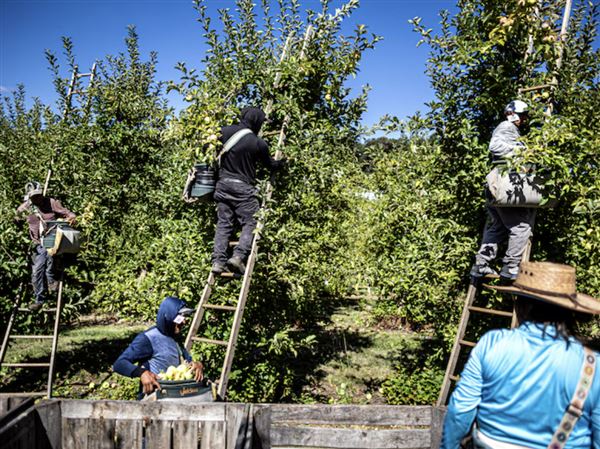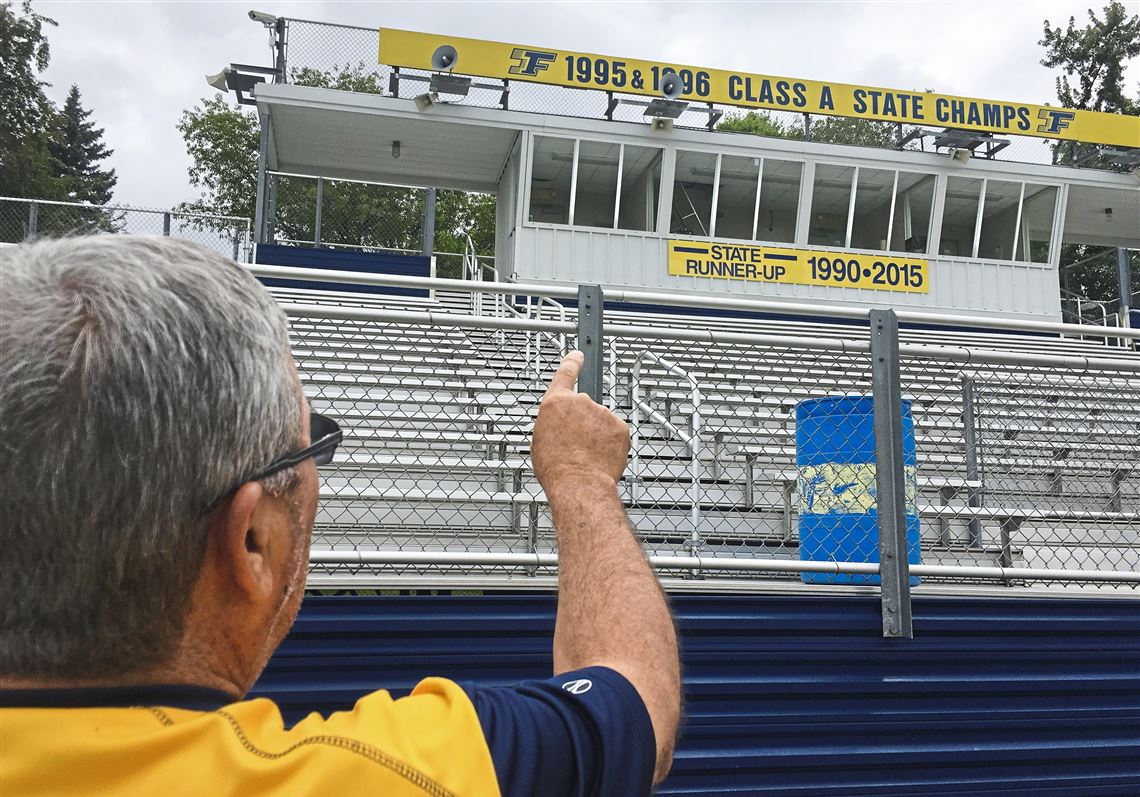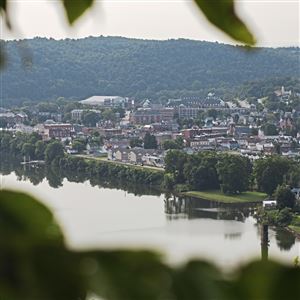Squeezed into about a square mile of the Shenango Valley, the city of Farrell still welcomes motorists along Route 760 with a sign proclaiming the 21 state titles won by its high school sports teams.
Lifelong residents speak fondly of Farrell athletics, the city’s 20th century heyday and a hopeful future to come — but it’s become difficult to boast about much in the racially diverse community with a rich industrial past.
Blighted or vacant properties predominate in a community that has lost nearly all of its retail and manufacturing businesses in recent decades.
City officials are focused on acquiring and rezoning such properties for redevelopment, but they realize that remaking a Mercer County town that has lost more than two-thirds of its population over the past century is an uphill battle. In the wake of manufacturing cutbacks, Farrell in 1987 became Pennsylvania’s first Act 47 “financially distressed” city, qualifying it for special state assistance. It still carries that distinction today.
“We’re not the same town anymore,” said city manager Mike Ceci. “We have to understand what we are. Sure, be proud of what you were, embrace the past, but you can’t stay there. You have to understand that certain things aren’t coming back and challenge yourself to say, ‘What can we be?’”
The potential for Farrell’s future is represented, in part, by the more than 130 properties that Mr. Ceci said the city’s Redevelopment Authority has acquired through tax liens and other means in recent years. The sites represent a significant portion of Farrell’s blight, and local officials hope down the road to obtain grants that enable new development such as residential construction.
The future is uncertain, but the past remains vivid for residents with recollections of vibrant mills like Wheatland Tube and Sharon Steel and the other local businesses they propped up decades ago. There are many fond memories of bleachers packed for coach Ed McCluskey’s seven state championship-winning basketball teams, plus powerhouse football and girls volleyball teams.
Roemer Boulevard is still Farrell’s main drag, but its companion business strip, Idaho Street, has lost much of its former luster.
“I can remember Saturday nights during Christmas time, you just walked up and down that street and looked in the windows. You could go into every store and spend 15 minutes there,” recalled Lou Falconi. “You go up Idaho Street today, there might be three buildings standing.”
When Mr. Falconi, 70, walks down Roemer to grab lunch at the Hilltop Tavern, one of few remaining post-game hangouts for locals, former players yell “Coach!” from passing cars, more than a decade after his retirement as a legendary football coach for Farrell High, whose field is named for him. His one-time classmates at the school stumble into him while he eats a couple “Margie Dogs,” and more than a few people call out to the local legend by name, though many friends have also left the area.
Mr. Falconi also served as a longtime councilman in the city to which his grandfather immigrated from Italy in the early 20th century. Such immigration was common around the local mills, then primarily Carnegie Steelworks. At the turn of the century, Farrell was at the center of a prosperous manufacturing region attracting an influx of Europeans, and it would subsequently gain a high number of black workers relocating from the South.
The city was teeming with churches, international and political social clubs, storefronts, movie theaters and more when Sharon Steel was running at peak volume, prior to its ultimate 1992 shutdown.
While passion for high school sports endures, Mr. Falconi said, the rest of those elements are largely gone from a city whose population has dipped below 5,000 — or about 11,000 less than its 1920 peak.
One unusual aspect of that population today is that Farrell is made up nearly equally of blacks and whites, a rarity among Western Pennsylvania municipalities. Its city council is composed of three white men and three black women, and its mayor, Olive McKeithan, is African-American.
Ms. McKeithan, 51, whose parents were drawn north from Alabama by Sharon Steel employment when she was an infant, is a former councilwoman in her third term as mayor. She has focused on anti-crime efforts and new business development in a city where auto service and repair shops, Sonoff’s cleaners, the AE Pustinger funeral home and a few bars stand out as the most visible signs of entrepreneurship.
The one main mill still operating in Farrell, Russian-owned NLMK, employs 750 people to process steel ingots and export rolled coil.
“Farrell used to be a very thriving city some years ago — we didn’t have to leave our community to do anything,” Ms. McKeithan explained. “Now we have to leave our community to go to the store, go to the movies, to wash our car, because the other cities have it.”
She and Mr. Ceci spoke of various efforts by the city in the present and looking ahead: buying and redeveloping the blighted properties; fostering relationships between the police department and the city’s black community; cutting municipal costs while landing grants.
Among the positive signs are a 30-unit apartment complex that was recently completed and plans that are underway for a new retail plaza. Also, FarmaceuticalRX LLC, a medical marijuana grower and processor, announced plans for a new plant expected to provide 30 jobs in the area.
Although Farrell’s industrial sector is but a shadow of its past, the fact that NLMK is still there with its sizable workforce remains vital for the city. The property and income taxes it generates represent about a quarter of the city’s $3 million budget, Mr. Ceci noted. He’s worried about the plant’s immediate future in an era of international battles over steel tariffs, although there’s little local officials can do but wait and hope for the best.
Meanwhile, local residents like Mr. Falconi will continue rooting for the Farrell Steelers while occasionally pausing to reminisce about better days — and better nights. He recalled the skies turning red after sunset above crowded bars and restaurants as the mills dumped their slag.
But he keeps looking forward, too.
“We’re still kicking,” he said, while praising the efforts of Mr. Ceci, Farrell’s city manager for the past six years.
But Mr. Ceci said it was the loyalty of men like Mr. Falconi that keeps the city hopeful.
“It’s a testament to the folks that have gone through that, stuck with the community and didn’t abandon it, because so many did,” Mr. Ceci said. “So many had to.”
First Published: November 10, 2018, 1:00 p.m.










![[TOWN] at a glance](http://liber.post-gazette.com/.media/2/2018/12/01/3de4ef5d-1aab-44e5-aea4-b640437ae02b.jpg)








